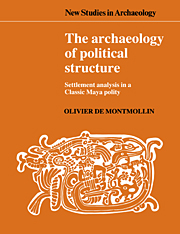Book contents
- Frontmatter
- Contents
- List of figures
- List of tables
- Preface
- 1 Studying ancient complex polities
- 2 Thinking about Maya political structure
- 3 The Rosario polity
- 4 Linking Maya politics and settlement
- 5 Centralization
- 6 Differentiation and integration
- 7 Political regimes and microcosms
- 8 Political stratification patterns
- 9 Mechanical versus organic solidarity
- 10 Segmenting versus non-segmenting organization
- 11 Archaeological study of Maya polities
- Notes
- References
- Index
1 - Studying ancient complex polities
Published online by Cambridge University Press: 29 March 2010
- Frontmatter
- Contents
- List of figures
- List of tables
- Preface
- 1 Studying ancient complex polities
- 2 Thinking about Maya political structure
- 3 The Rosario polity
- 4 Linking Maya politics and settlement
- 5 Centralization
- 6 Differentiation and integration
- 7 Political regimes and microcosms
- 8 Political stratification patterns
- 9 Mechanical versus organic solidarity
- 10 Segmenting versus non-segmenting organization
- 11 Archaeological study of Maya polities
- Notes
- References
- Index
Summary
The study of political structure in ancient complex polities exercises a powerful attraction on archaeologists working in Mesoamerica and many other parts of the world. Intense interest and energy are invested in trying to describe and understand complex polities which are ancient or traditional in the sense that they often predate and always differ from modern European nation-states (Southall 1965; Giddens 1985). Before proceeding with a study of politics in one or more ancient complex polities, pausing to look at the general reasons for the attraction of such studies proves instructive since these reasons directly affect problem orientation, theory, and methodology. Reasons for studying ancient complex polities revolve around four broad themes: the evocation of great questions (origins of the state, complexity, civilization); the use of data and concepts from political anthropology; the problems encountered in constructing analogies (models); and the vigorous effort and reasoning required for constructing bridging arguments to link theoretical concepts and archaeological data. A number of approaches may be adopted with reference to these four broad themes. My own approach is one of bias in favor of anthropological archaeology which combines a comparative search for general principles with an (intellectual) respect for diversity in political structure and behavior. Such an approach lies towards the relatively more fruitful middle ground of a spectrum. At one end are the highly generalizing approaches in the archaeology of ancient complex societies which deal in political universals and sweeping conclusions about the human condition. At the other end of the spectrum are the highly particularistic approaches which refuse to deal with any comparative generalization and limit themselves to descriptions of single ancient complex polities or cultures.
- Type
- Chapter
- Information
- The Archaeology of Political StructureSettlement Analysis in a Classic Maya Polity, pp. 1 - 10Publisher: Cambridge University PressPrint publication year: 1989



